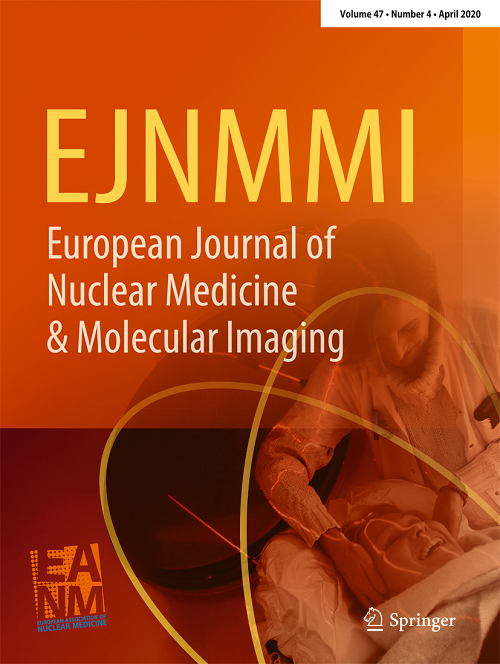Preclinical evaluation of [211At]At-AuNP-ABDMPL16 for targeted alpha therapy in Melanoma.
IF 8.6
1区 医学
Q1 RADIOLOGY, NUCLEAR MEDICINE & MEDICAL IMAGING
European Journal of Nuclear Medicine and Molecular Imaging
Pub Date : 2025-05-20
DOI:10.1007/s00259-025-07238-7
引用次数: 0
Abstract
PURPOSE The aim of this study is to overcome the challenges of poor tumor penetration and systemic toxicity in targeted alpha therapy (TAT) while also evaluating its immunomodulatory effects to enhance antitumor immune responses in melanoma treatment. METHODS This study developed a 211At-labeled single-domain antibody agent ([211At]At-AuNP-ABDMPL16) targeting PD-L1, a protein overexpressed in melanoma cells. The binding affinity and internalization of [211At]At-AuNP-ABDMPL16 were evaluated in vitro using melanoma cell lines. In vivo studies in melanoma-bearing mice were conducted to assess biodistribution, pharmacokinetics, therapeutic efficacy, and the immune response induced by the treatment. RESULTS [211At]At-AuNP-ABDMPL16 demonstrated high binding affinity and efficient internalization in melanoma cells, resulting in significant tumor cell death through α-particle radiation. In vivo, [211At]At-AuNP-ABDMPL16 preferentially accumulated in tumors, inhibited tumor growth, and prolonged survival in melanoma-bearing mice. The treatment also triggered a robust anti-tumor immune response, marked by increased cytotoxic T lymphocytes and reduced regulatory T cells within the tumor microenvironment, with minimal systemic toxicity. CONCLUSION [211At]At-AuNP-ABDMPL16 shows promise as a novel therapeutic for melanoma, combining effective tumor targeting with potent cytotoxic and immune-activating effects. These findings support further investigation of this 211At-labeled single-domain antibodies in clinical applications.[2111at]At-AuNP-ABDMPL16在黑色素瘤靶向α治疗中的临床前评估。
目的:本研究旨在克服靶向α疗法(TAT)肿瘤穿透性差和全身毒性的挑战,同时评估其免疫调节作用,以增强黑色素瘤治疗中的抗肿瘤免疫反应。方法本研究开发了一种211At标记的单域抗体制剂([211At]At-AuNP-ABDMPL16),靶向黑色素瘤细胞中过表达的蛋白PD-L1。[2111at]At-AuNP-ABDMPL16的结合亲和力和内化作用在体外用黑色素瘤细胞系进行了评估。在黑色素瘤小鼠体内进行了研究,以评估生物分布、药代动力学、治疗效果和治疗引起的免疫反应。结果[2111at]At-AuNP-ABDMPL16在黑色素瘤细胞中表现出高结合亲和力和高效内化,通过α-粒子辐射导致肿瘤细胞明显死亡。在体内,[2111at]At-AuNP-ABDMPL16在肿瘤中优先积累,抑制肿瘤生长,延长黑色素瘤小鼠的生存期。该治疗还引发了强大的抗肿瘤免疫反应,其特征是肿瘤微环境中细胞毒性T淋巴细胞增加和调节性T细胞减少,具有最小的全身毒性。结论[2111at]At-AuNP-ABDMPL16结合了有效的肿瘤靶向作用和强大的细胞毒性和免疫激活作用,有望成为一种新的黑色素瘤治疗药物。这些发现支持进一步研究这种211at标记的单域抗体在临床应用中的应用。
本文章由计算机程序翻译,如有差异,请以英文原文为准。
求助全文
约1分钟内获得全文
求助全文
来源期刊
CiteScore
15.60
自引率
9.90%
发文量
392
审稿时长
3 months
期刊介绍:
The European Journal of Nuclear Medicine and Molecular Imaging serves as a platform for the exchange of clinical and scientific information within nuclear medicine and related professions. It welcomes international submissions from professionals involved in the functional, metabolic, and molecular investigation of diseases. The journal's coverage spans physics, dosimetry, radiation biology, radiochemistry, and pharmacy, providing high-quality peer review by experts in the field. Known for highly cited and downloaded articles, it ensures global visibility for research work and is part of the EJNMMI journal family.

 求助内容:
求助内容: 应助结果提醒方式:
应助结果提醒方式:


